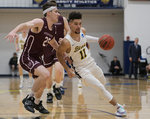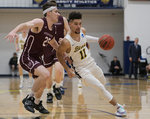

After suffering a seizure at 6 years old that left him unable to read, write and speak for two years, doctors told Kirkley he’d never be a regular student. Now the former Mossyrock basketball standout is shining as a student-athlete at Whitman College.
WALLA WALLA, Wash. — Jaron Kirkley has more than one “happy place,” but the zones in which the former Mossyrock Vikings boys basketball standout thrives have decisive traits in common.
Back to the land, face to the surf, angling for rockfish and lingcod along the serrated coastline at Ocean Shores; Gliding through the vastness of the Strait of Juan de Fuca in a kayak, fishing rod at the ready; Plucking salmon out of the Cowlitz River; Still, waiting, patient, in a deer-hunting blind somewhere in the wilds of East Lewis County; Hoisting jump shot after jump shot after jump shot, alone, in a gym tucked inside the swelter of a Walla Walla summer; Basketball in hand, one-on-one against a defender, nary another soul within his peripheral vision;
Whether in natural or indoor spaces, Kirkley seeks quietude of mind. Challenges faced and overcome in childhood have helped him cultivate a love of open space, which “bring me into focus, into an awareness, a calm,” he said.
“I like being undisturbed by thoughts,” added Kirkley, who led Mossyrock to the Class 2B state championship game as a senior in 2016. “When I’m in nature, I’m not thinking of the future or the past.”
Kirkley’s basketball trajectory at Whitman College, in the remote Southeastern corner of the state, makes perfect sense in this light. His first three seasons had an understudy quality for the national juggernaut Blues, whose Class of 2019 won more games over four years than any other class in the history of NCAA Division III basketball in America, advancing to the Sweet 16, Final Four, Elite Eight and Sweet 16 in that span.
After three seasons of limited playing time and relentless fine-tuning, Kirkley has exploded in a starting role.
He has remained true to himself, self-reliant, self-motivating; serene in solitude or in the howl of the arena, driven in the shadows or the spotlight.
His professors at Whitman revere his respect for learning, his sincerity, his intellectual curiosity. Blues head coach Eric Bridgeland, who considers Kirkley “the best one-on-one player we’ve ever had in open space,” calls Kirkley’s focus, drive and refusal to make excuses “breathtaking.”
The environmental studies/geology major is committed to the painstaking, incremental, moment-by-moment journeys that lead to his big goals: To play professional basketball overseas; to write a book about his life, and the “mind-sets and actions required to get through moments that people consider impossible;” to build a facility where fitness, nutrition and the mental aspects of competition are addressed holistically, and where Kirkley can teach, and indulge his fascination with “how the mind and body are connected.”
“Not everyone is perfect,” said Kirkley, who has worked around a minor knee sprain early this season, opened his senior campaign with a career-high 30 points, and ranks fifth among all Northwest Conference players in shooting percentage for the first-place Blues. “But everyone has something they’re good at. Something where they’re in that ‘zone,’ where time doesn’t exist.
“I can spend six, eight hours or work in the gym in the summer and it feels like one hour,” he added. “When you find a passion for something like that, you should keep it going.”
Before basketball was a passion for Kirkley, long before he was sizzling through the paint like a spark consuming fuse, it was a lifeline. When Kirkley was six years old, he suffered a rare, potentially catastrophic seizure related to Acquired Epileptiform Aphasia, which severed his relationship with language.
“I went silent,” he said. “I couldn’t speak, read or write.”
For two years.
Kirkley finally began to speak again in the second grade. But he continued to have smaller seizures which “slowed [my] process of language.” By the seventh grade, Kirkley said he was at a first-grade level for reading, writing and speaking.
Essays his friends could knock out in an hour took him 20. And he bore the weary encumbrance of being told by authority figures, again and again, what he couldn’t do.
“My entire life, doctors and neuro-psychologists said that I’d never be a regular student,” Kirkley said.
In that desolation, basketball kept Kirkley centered. It gave him a way of expressing himself -- to himself, and to and with others — in lieu of language proper.
“It was the one reason I got through that challenge,” he said. “Basketball was the only thing that I really loved. I wanted to keep that going. Basketball took my mind off doctors, off being talked down to, off of missing my dad [who was playing basketball, professionally, overseas].”
Basketball was a source of hope. A link to a future. Because Kirkley knew he’d “need to be able to read, write and speak like everyone else if [he] wanted to play college basketball,” he worked as hard as he could on those three areas.
He graduated second in his class at Mossyrock.
“Learning, for Jaron, has this miraculous quality, because he was told at a young age that he’d always be crippled in his relationship to language,” said Tom Davis, an associate professor of philosophy at Whitman, with whom Kirkley has studied Ralph Waldo Emerson. “It has made him pursue learning in an exponentially different way than most students, who take learning for granted.”
“What a rich life he’s lived already,” Bridgeland added. “Whatever Jaron has a passion for, he doesn’t want to be average. He works to be the best he can be. No shortcuts — that’s the essence of Jaron. He just keeps working and working. He’s so methodical because of the adversity he faced growing up.
“He’s just comfortable in his own skin.”
Kirkley has thrived as much in the classroom as on the court, finding genuine mentors at Whitman.
“I never knew professors would be so caring and so interested in how you’re doing, personally,” he said. “Especially professors like Tom Davis and Lyman [Persico], who have helped me find my path.”
That admiration is mutual.
“Jaron’s background and life experiences are quite atypical for a Whitman environmental studies major,” said Persico, an assistant professor of geology and environmental studies. “He contributes important perspectives and insight to classroom discussions that might have otherwise been absent. He carries himself with a quiet sense of calm inquisitiveness. He is thoughtful, respectful and incredibly open to new ideas and new ways of thinking. It is inspirational to work with a person so committed to his education, his team and his family.”
Added Davis: “He heard a lot of ‘No’ as a child from authority figures, from people he trusted. There was something that made him discover self-trust, for himself. He’s really tuned into the gift of learning, and he wants to share that sense of the gift of learning.”